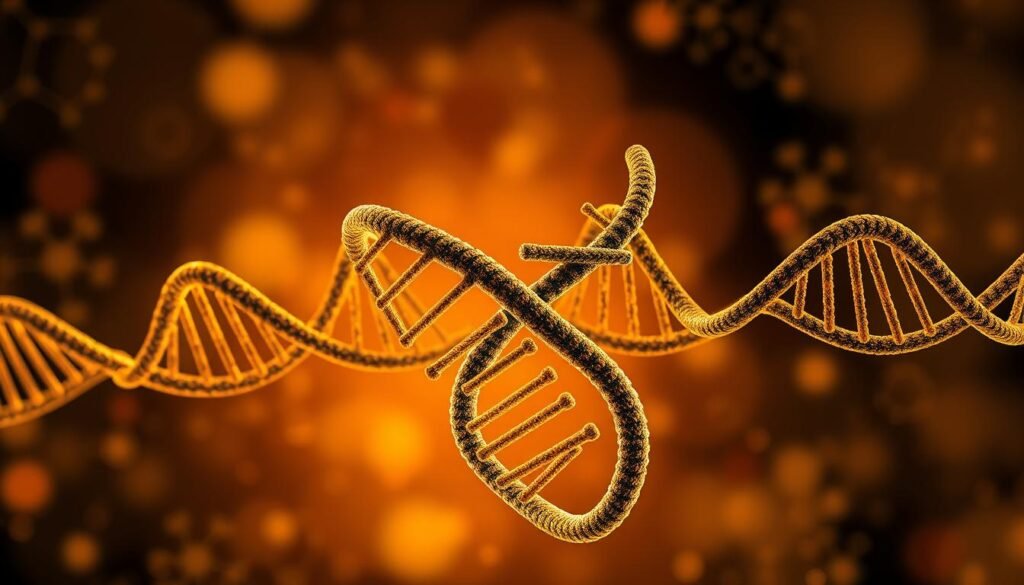Have you ever felt like no matter what you do, your weight just won’t budge? I’ve been there. For years, I’ve struggled with the same question: Am I destined to be this way forever? It’s a frustrating journey, one that many of us share. In the United States, 40% of adults face obesity, and the numbers keep rising1.
What makes it so hard to lose weight? Studies show that factors like genetics and environmental chemicals play a significant role. For example, certain gene variations can increase the risk of obesity by 20% to 30%1. Even with lifestyle changes, the odds of success can feel slim. Recent research reveals that the standard approach of eating less and exercising more has a success rate of just 1 in 2202.
Despite these challenges, I’ve learned that understanding the science behind our body is crucial. It’s not just about willpower—it’s about addressing the systemic issues that make weight management so difficult. This article dives into my personal journey and explores the broader factors influencing our health.
Key Takeaways
- 40% of adults in the U.S. struggle with obesity1.
- Genetics can increase obesity risk by 20% to 30%1.
- The standard weight loss approach has a low success rate2.
- Environmental factors and chemicals impact weight management.
- Understanding systemic issues is key to overcoming challenges.
Understanding the ‘Fat Forever’ Phenomenon
For years, I’ve questioned whether my weight struggles were permanent. It’s a belief that many of us carry, shaped by societal norms and medical narratives. My journey has been filled with moments of doubt, but also profound realizations that challenged this fixed mindset.
My Personal Journey and Realizations
Growing up, I was constantly told that my body was a reflection of my choices. But as I got older, I realized it wasn’t that simple. Studies show that obese adults produce twice as many new fat cells each year compared to lean individuals, yet both groups replace about 8% of their fat cells annually3. This made me question the role of biology in my struggles.
Time played a significant role in shaping my understanding. Over the years, I’ve tried countless diets and exercise routines, only to see minimal results. It wasn’t until I examined the process more deeply that I began to see the bigger picture.
Examining the Belief and Its Implications
The belief that weight gain is permanent is deeply ingrained in our culture. From childhood, we’re taught that being overweight is a personal failure. Yet, research shows that 75% of obese children continue to face obesity as adults3. This statistic made me rethink the narrative I’d been fed.
Challenging this belief wasn’t easy. It required me to confront my own insecurities and question the systems that perpetuate these ideas. But in doing so, I’ve found a new perspective—one that focuses on understanding rather than judgment.
The Impact of Industrial Chemicals on My Weight
I never realized how much industrial chemicals could shape my body until I dug deeper into the science. It turns out, substances like PFAS—often called “forever chemicals”—play a significant role in disrupting our metabolism and contributing to weight gain4. These chemicals are everywhere, from food packaging to drinking water, and their effects are more profound than I ever imagined.

Forever Chemicals and Cellular Disruption
PFAS compounds interfere with our cells’ ability to produce energy. They replace key elements in our cells, blocking the normal process of breaking down food and converting it into usable energy4. This disruption can lead to metabolic issues, making it harder for the body to regulate weight effectively.
Studies from Clemson University and King’s College, London, show that PFAS exposure in mice led to significant weight gain5. Human studies also reveal similar patterns, linking these chemicals to increased body weight and health complications6.
How PFAS Influence Our Metabolism
These chemicals don’t just stop at cellular disruption. They also alter how our bodies store and use energy. For example, PFAS can mimic hormones, confusing the body’s natural processes and leading to imbalances that promote weight gain4.
Research shows that PFAS exposure during critical developmental periods, like pregnancy, can have long-lasting effects. Offspring of exposed mice showed increased body weight, which persisted across generations5. This highlights how these chemicals can place our bodies at a disadvantage from the very start.
Understanding the role of industrial chemicals has been eye-opening for me. It’s not just about diet or exercise—it’s about the invisible factors that shape our health in ways we’re only beginning to understand.
Challenges with Conventional Weight Loss Strategies
I’ve spent years following conventional weight loss advice, only to find it falling short. The mantra of “eat less, move more” seems simple, but the reality is far more complex. Despite my best efforts, I’ve often felt stuck, wondering why this approach didn’t work for me.

Limitations of the ‘Eat Less, Move More’ Approach
The standard advice to cut calories and increase exercise often fails to deliver long-term results. Studies show that more than 50% of lost weight is regained within two years, and by five years, over 80% is regained7. This highlights the temporary nature of this strategy.
One reason for this is that our bodies adapt to reduced calorie intake. For each kilogram of lost weight, calorie expenditure decreases by 20–30 kcal/day7. At the same time, appetite increases, making it harder to maintain the loss.
What Recent Studies Revealed About Obesity
Recent research underscores the complexity of weight management. A meta-analysis of 29 long-term studies found that most people regain the weight they lose7. This isn’t just about willpower—it’s about how our bodies respond to changes in diet and exercise.
Another fact is that exercise and diet alone don’t address the systemic issues behind obesity. For example, ongoing interaction with healthcare providers significantly improves weight maintenance outcomes7. This suggests that long-term success requires more than just individual effort.
Understanding these challenges has been eye-opening for me. It’s clear that conventional strategies often overlook the individualized factors that influence weight loss and gain. This realization has led me to explore alternative approaches, which I’ll discuss in the next section.
Exploring Hormone Imbalances and Weight Gain
Hormones play a far bigger role in weight management than I ever realized. For years, I focused on diet and exercise, only to find that my efforts were often undermined by unseen factors. It wasn’t until I learned about the intricate hormonal system that I began to understand why weight loss felt so elusive.

The Special Role of the Thyroid in Metabolism
The thyroid is a key player in regulating metabolism. When it’s not functioning properly, it can slow down your body’s ability to burn calories, even if you’re following a strict diet. Research shows that improper thyroid hormone replacement can lead to persistent weight gain8.
I discovered that even small imbalances in thyroid hormone levels can have a significant impact. For example, hypothyroidism—a condition where the thyroid is underactive—can cause fatigue, weight gain, and difficulty losing weight8. This made me realize how crucial it is to address thyroid health in any weight management plan.
Insulin, Leptin, and Other Hormonal Factors
Insulin and leptin are two other hormones that play a critical role in weight regulation. Insulin helps control blood sugar levels, but resistance to this hormone can lead to weight gain and difficulty losing it9. Leptin, on the other hand, signals fullness, but obesity often leads to leptin resistance, making it harder to feel satisfied after meals8.
These hormonal imbalances highlight a critical point: traditional weight loss strategies often fail to account for the unique hormonal type and level of each person. For instance, studies show that high cortisol levels, often elevated during dieting, can increase belly fat and break down calorie-burning muscle10.
Understanding these factors has been a game-changer for me. It’s clear that addressing hormone imbalances is essential for effective weight management. This realization has laid the foundation for exploring more personalized strategies that consider my unique hormonal system.
Strategies to Lose Weight When You Feel Destined to Be “Fat Forever”
When I first started my journey to better health, I felt overwhelmed by the sheer number of options and conflicting advice. It seemed like every expert had a different way to approach losing weight, and I wasn’t sure where to begin. Over time, I realized that the key wasn’t about following the latest trend but finding a sustainable approach that worked for me.

Reassessing Diets, Exercise Routines, and Lifestyle
Traditional methods like calorie counting and intense workouts often fail to deliver long-term results. Studies show that 99% of people regain the weight they lose using these approaches11. Instead, I focused on making gradual changes to my diet and exercise routine. For example, I started by adding more whole foods and reducing processed sugars.
Another way I found success was by incorporating strength training into my routine. Unlike cardio, which burns calories during the workout, strength training helps build muscle that burns calories even at rest. This small shift made a big difference in my losing weight journey.
Building a Supportive Environment
One of the most overlooked aspects of losing weight is the environment we create around us. Research shows that having a supportive community can significantly improve weight loss outcomes12. I joined a group like the Nerd Fitness Rebellion, where I found encouragement and accountability.
I also made changes at home, like keeping healthy snacks within reach and removing temptations. These adjustments helped me stay on track without feeling deprived. It’s amazing how small changes in your surroundings can make a big difference in your way of life.
Ultimately, the journey to losing weight is about finding what works for you. It’s not about drastic changes but consistent, sustainable habits. By reassessing my approach and building a supportive environment, I’ve been able to make progress in a way that feels manageable and rewarding.
Long-Term Health and Lifestyle Changes for Sustainable Weight Loss
Sustainable weight loss isn’t about quick fixes—it’s about creating habits that stick. Over time, I’ve learned that small, consistent changes are the key to lasting results. Studies show that only about 10% of people successfully maintain their weight loss long-term13. This made me realize that the real work lies in building routines that become a natural part of life.

Implementing Habit Changes That Last
One of the most important lessons I’ve learned is that habits take time to form. Research suggests that it takes an average of 66 days for a new behavior to become automatic14. For me, this meant focusing on one change at a time, like drinking more water or getting enough sleep. Studies indicate that adequate hydration can help control hunger and boost metabolism14.
Another habit I’ve adopted is mindful eating. By paying attention to what and when I eat, I’ve reduced my calorie intake by 20-30% without feeling deprived14. This approach has been a game-changer in managing weight gain and improving my overall health.
Tracking Progress Over Time
Tracking my progress has been essential in staying motivated. Research shows that monitoring your habits can lead to a 30% increase in adherence to weight loss plans14. I use a simple journal to record my meals, exercise, and how I feel each day. This helps me identify patterns and make adjustments as needed.
Setting realistic goals has also been crucial. Studies recommend aiming for a healthy rate of weight loss, such as 0.5-2 pounds per week13. This approach has helped me stay focused without feeling overwhelmed. It’s a reminder that sustainable change is a gradual process, not something that happens overnight.
By combining habit formation with consistent tracking, I’ve been able to make lasting changes that support my health. It’s a continuous journey, but one that’s worth the effort.
Conclusion
My journey to better health has taught me that lasting change requires more than just willpower. Over the years, I’ve learned that environmental factors, hormonal imbalances, and ineffective strategies play a significant role in weight management. The thing I’ve realized is that a one-size-fits-all approach rarely works.
Despite the challenges, there’s a real chance to reclaim your health. By adopting a well-informed, personalized strategy, you can make meaningful progress. Studies show that gradual changes, like mindful eating and strength training, lead to better long-term results15.
This journey isn’t easy, but it’s worth it. Every small step you take contributes to a healthier, more empowered life. Over the coming years, continued effort and adaptation can make all the difference. Remember, you’re not alone in this—there’s always a chance to move forward.
FAQ
Why do I feel like I’m destined to stay overweight?
How do industrial chemicals like PFAS affect my weight?
Why doesn’t the “eat less, move more” approach work for me?
How do hormones influence weight gain?
What lifestyle changes can help me lose weight sustainably?
How can I reassess my diet and exercise routine for better results?
What role does the thyroid play in weight management?
How can I track my progress over time?
Source Links
- https://www.webmd.com/obesity/features/are-you-fated-be-fat
- https://www.restartmed.com/destined-to-be-overweight-forever/?srsltid=AfmBOortjp_d6JNHIUR0sdLC_IjKMF_plzN5-Yi1Bcx2nqNOouQEUBJH
- https://www.nationalgeographic.com/science/article/fat-cell-number-is-set-in-childhood-and-stays-constant-in-adulthood
- https://www.ewg.org/news-insights/news/2022/09/chemicals-our-food-may-be-contributing-weight-gain
- https://pmc.ncbi.nlm.nih.gov/articles/PMC5359373/
- https://pmc.ncbi.nlm.nih.gov/articles/PMC10942849/
- https://pmc.ncbi.nlm.nih.gov/articles/PMC5764193/
- https://www.weightlossandvitality.com/blog/the-hormonal-symphony-of-obesity
- https://www.eatingwell.com/article/7917054/what-happen-to-your-hormones-when-you-lose-weight-according-to-a-dietitian/
- https://trainforeverstrong.com/hormones-cortisol-weight-gain-exercise/
- https://www.personaltrainerfood.com/blog/how-to-lose-weight-and-keep-it-off-for-good/
- https://www.nerdfitness.com/blog/study-suggests-were-doomed-to-stay-fat-wait-what/
- https://strongwithsarah.com/blog/2023/8/28/6-habits-for-sustainable-fat-loss
- https://foreverweightlossstl.com/how-to-lose-weight-fast-scientific-and-sustainable-tips/
- https://triagemethod.com/how-to-lose-fat-and-keep-it-off-forever/





